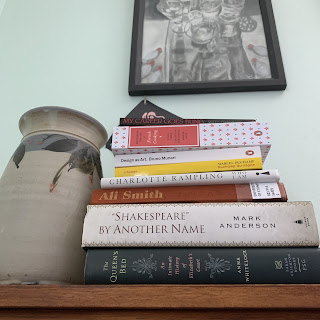Little things matter, making sense matters - Report 8 March
After being away on two research trips to England, France and Italy, I'm back at my desk doing the work of an arts doctoral candidate. Description of actual reading method follows. Report.
 |
| Flying back to Sydney 11 Feb 2023 |
How I actively read papers.
I have a system that goes a little like this. You might think it very constrained and constraining when I tell you I use tables (either in Word or Page, I'm a digital Rake) into which I paste text that I’ve divided into small chunks: roughly about the length of a line (14-15 words) or by to the end of a morsel of thought.
The original text goes into the first column and then I have 3 other columns waiting to take my thoughts, observations & associations, and then any research that I'm aware of or need to look up. Each column, potentially, is a more considered thread coming out from, or digging into, the nub of the original text. It sounds messy but because the text is contained in the table cells, any cell that starts to bulge with material —that looks like it could be a whole sentence, or passage, or paragraph—I take that text to another page or a clear space below the table on the same doc, and follow that flow until it runs out.
I start to read the passage, let's say it's an abstract: I will type my first impressions into the boxes of the first column. Sometimes, as happened today, my first note will be very unromantic: ‘that sentence doesn’t make sense’ [it's happened a couple of times in the last three-and-a-half years].
Today I’ve been reading a new paper that came out late last year, which means I really do need to be across it for my own project, even at this late stage, with my final deadline now set for June.
This system of active reading is different to when I'm scrutinising a text (see more about how I scrutinise text here). But I did slip into scrutinising mode when I saw the first sentence: [so-and-so] has been associated with [however-many] roles: [their] experience as [blah-blah], highlighting [such-and-such] and [their] travels. I would suggest that this is a nonsensical sentence (my editorial brackets notwithstanding) and I got caught up unpacking why. Why was this sentence nonsensical? And here's the thing: a role is not an experience.
Certainly, the parts we play, for 'all the world's a stage', is a huge part of our experience. But this is what the sentence says: Person has been associated with roles: [followed by list of] 'experience as,' 'highlighting,' and 'travels'. The last, 'travel,' is an activity not a role. I would prefer, traveller. Traveller is a role.
So I got so caught up today on the fact this abstract leads with this grammatical, syntactical, wordified strangeness: experience is a role? 'Travel' is a role? And I couldn't unread it. It churned around at the front of my mind all day while I tried to read the rest.
Yes, we can say that this person can be associated with a role or roles, though I would also suggest that the person has been assigned roles, (rather then being associated with them) since roles are social constructs. And that's the crux of the problem when writing about eighteenth-century women. We are still looking at these people through a role-lens, and we have to be aware of this.
So, yes, your eighteenth-century subject was role-assigned. But they also had experiences, which are not roles, though they were determined by them.
This post is a portrait of the mind of one concerned with text, with theses, with what words do and why we should care. Do you think I should have cared less about how sentences work? Me too. It would make reading more ... enjoyable. And I would have got further today than this paper's abstract.
Logged by J.


Comments
Post a Comment